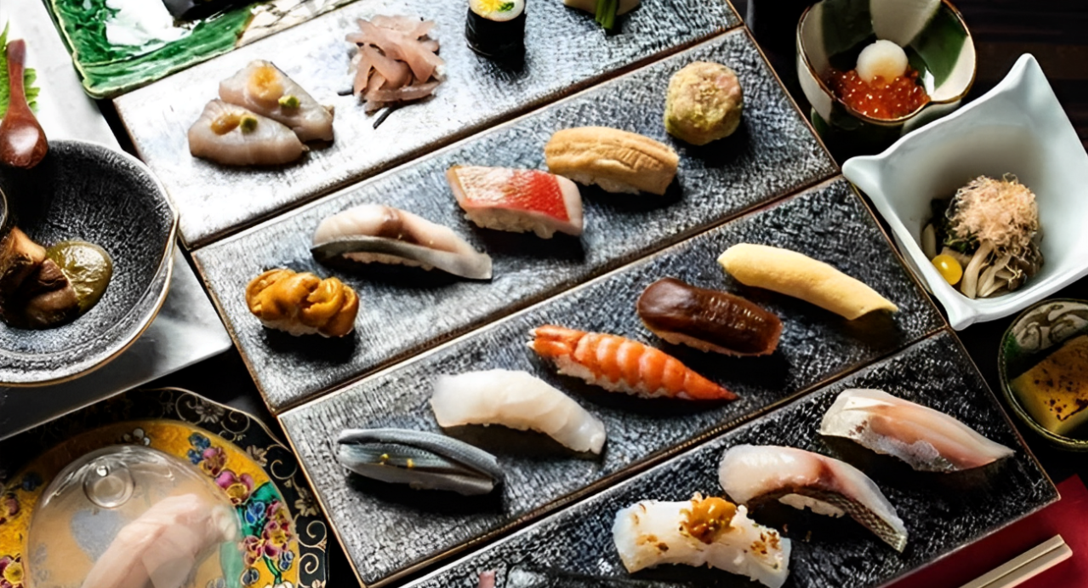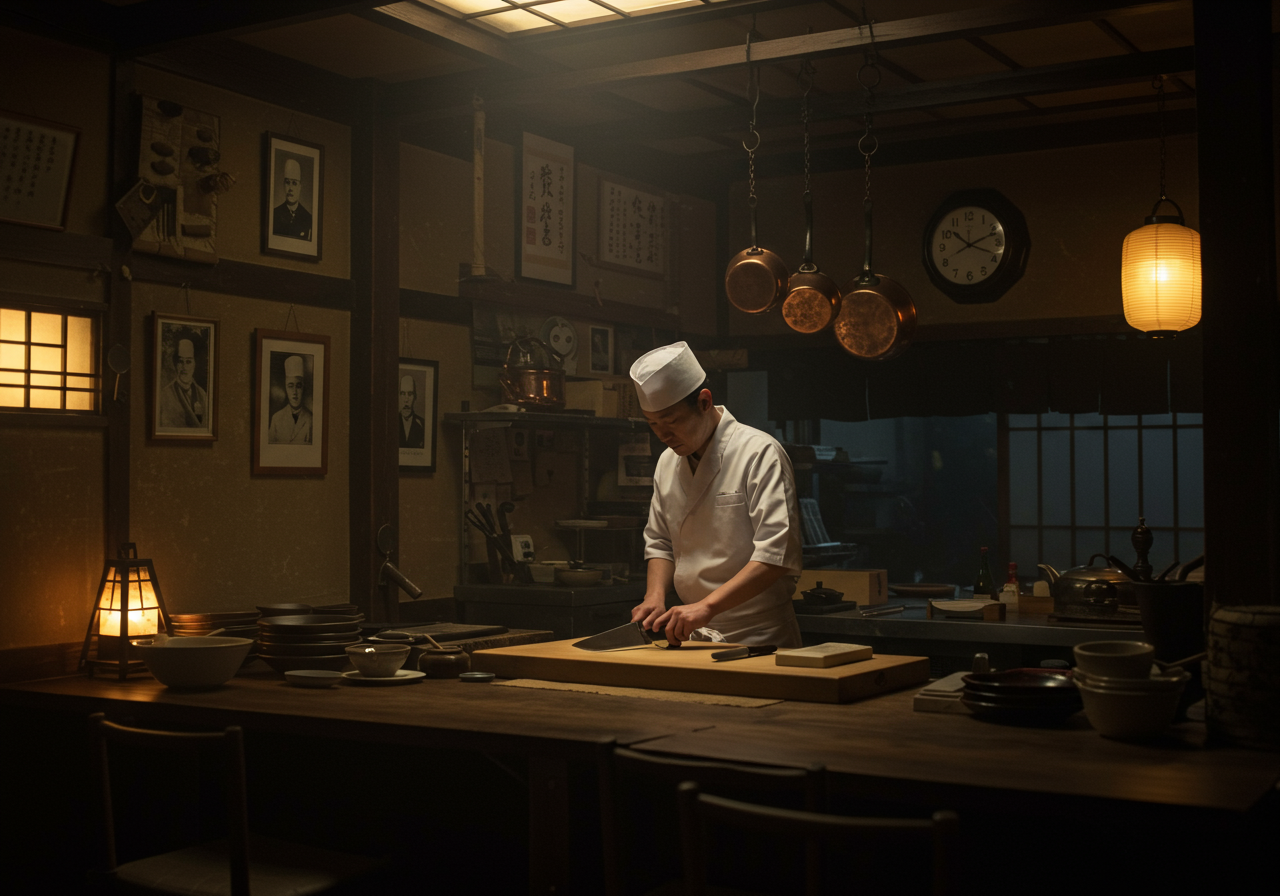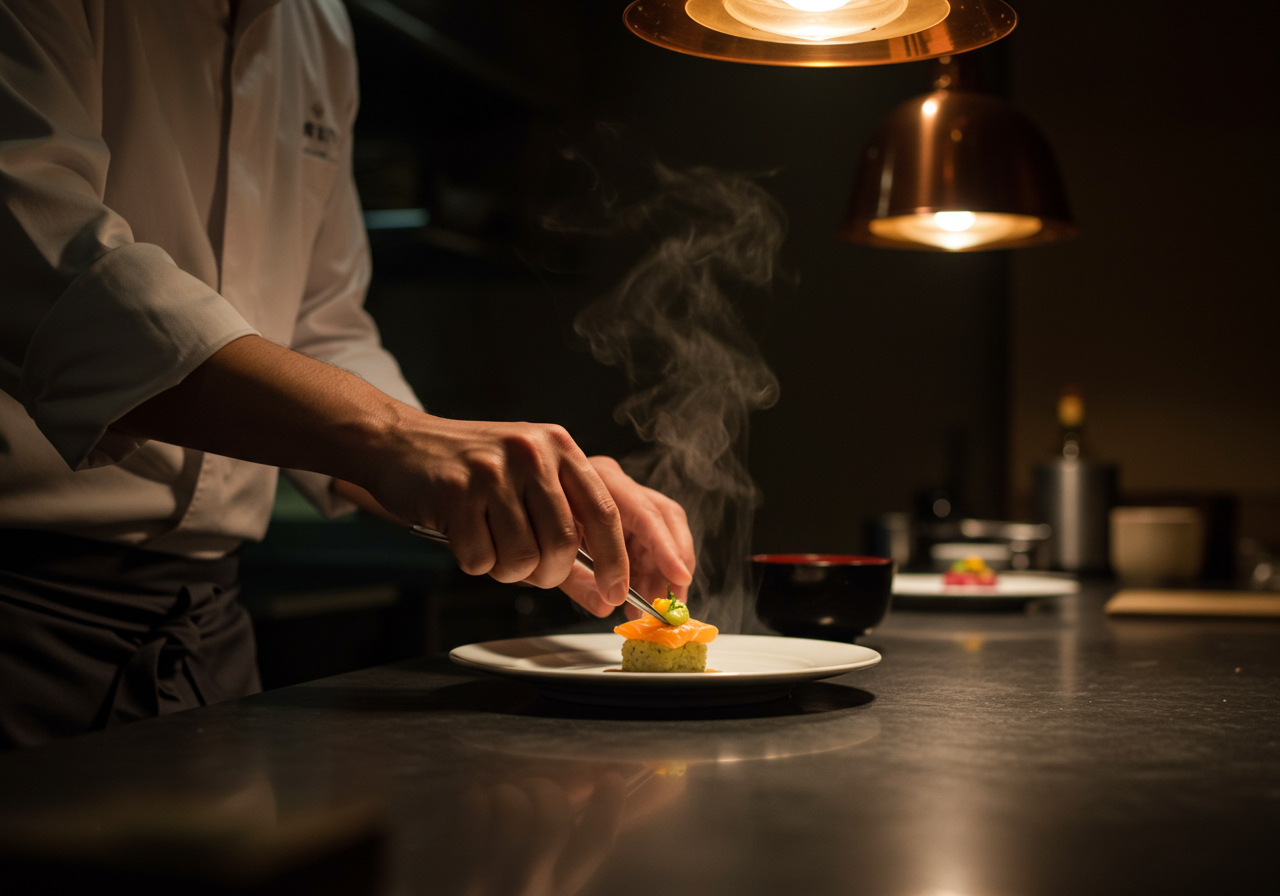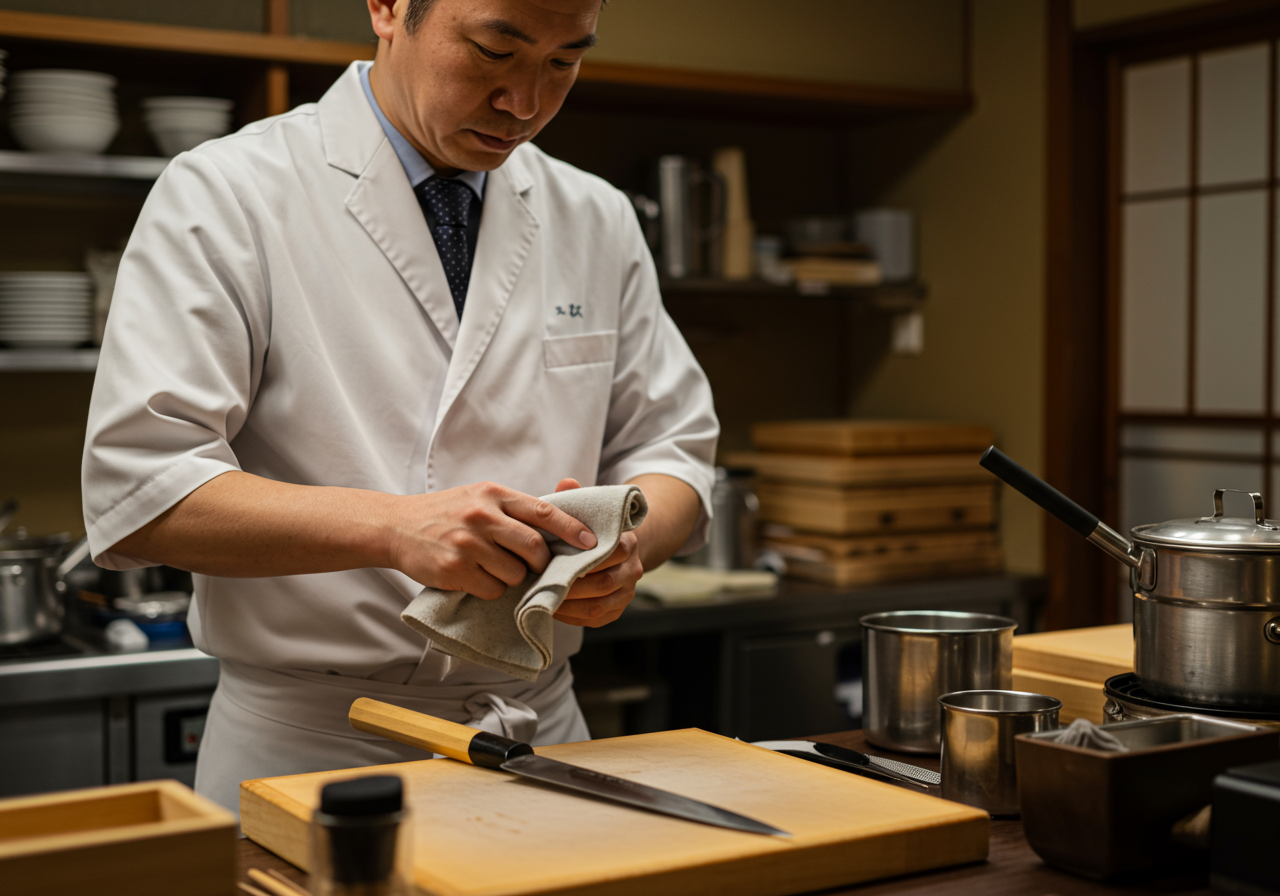
The Chef’s Code: Character and Attitude
-
Skill shapes the dish—but character shapes the chef.
Before a chef’s knife ever touches an ingredient, what matters most is the character behind the blade. In this video, we explore the invisible qualities—humility, respect, trust—that shape a chef’s true flavor. These lessons are not about technique, but about who you are in the kitchen. If you’ve ever doubted yourself or faced struggle at the stove, this is your reminder: strength as a chef begins with strength as a person.
-
-
During my time studying at a sushi school in Tokyo—and later, through years in real kitchen work—I came to realize something important.
Before technique, before knowledge, what truly shapes a chef is how we carry ourselves as people. -
Skill can be sharpened with daily practice.
But trust, as a human being, takes time, consistency, and humility to build.
In the kitchen, every word, gesture, and attitude becomes part of your “flavor” as a chef.This chapter begins with one simple idea:
“Before you are a chef, be someone worth respecting.”
I hope that what I share here offers a moment of reflection, and if even a small insight stays with you, that would mean the world to me. -
1. Before You Are a Chef, Be Someone Worth Respecting
Before you become a great chef, you must first be someone who is respected and trusted as a person.
No matter how refined your skills may be, without strong character, your work will never earn lasting recognition. -
In the kitchen, you interact with many people every day—your team, your suppliers, your guests.
Because cooking is a profession that touches people’s hearts, who you are as a person can leave an even deeper impression than the flavor of your food. -

Courtesy, empathy, and a sense of responsibility—these are qualities that naturally appear in your daily actions.
Building trust as a person comes before building a name as a chef.
That is the first step to becoming a chef who is loved for a lifetime. -
2. Trust Is Proven Through Actions, Not Words
Trust doesn’t come from saying “trust me.”
It grows naturally through small, consistent actions repeated over time.Arriving early and quietly cleaning the kitchen.
Supporting a teammate without judgment when they make a mistake.
Following through on what you said you’d do—every time.These are the kinds of behaviors that make people say,
“I want to work with this person.” -

In the culinary world, it’s not those who talk the most who earn respect,
but those who speak through their actions.True trust is not declared—it’s demonstrated.
-
3. A Handful of Skill, a Pinch of Character
In the culinary world, being highly skilled is certainly important.
But skill alone does not make you great.No matter how precise your knife work is,
no matter how beautiful your plating may be,
if you lack character, trust will not last. -

Skill is something people can see.
But character reveals itself in the unseen—
in how you speak, how you treat your team, and how you carry yourself day by day.The saying “a handful of skill, a pinch of character” is a reminder:
Don’t be consumed by technique—never forget the human qualities that give your work meaning.In the end, the dishes that truly move people are born from skill enriched with character.
-
4. Stay Humble, Never Arrogant
As your skills improve, people will start to praise you.
Customers will smile, senior chefs will take notice, and younger cooks may begin to rely on you.
But this is exactly when you must hold onto humility.The culinary path has no finish line.
No matter how much experience you gain, there will always be more to learn, more to master.
Sometimes you'll learn from someone younger than you.
Sometimes your own mistakes will teach you the most. -

Arrogance chips away at trust—quietly, little by little.
By the time you notice it, it may already be too late.Those who can say, “I still have a long way to go,” even as they grow,
are the ones who continue to truly evolve.Take pride in your work—but never let pride turn into ego.
Humility is not weakness—it’s a chef’s quiet strength. -
5. Refine Yourself, Elevate Yourself
Sharpening your knife skills or mastering preparation techniques is an essential part of being a chef.
But just as important—if not more—is the ongoing effort to refine yourself as a person.A dish reflects the person who makes it.
Your choice of words, your body language, your sense of awareness and care—
who you are in daily life shows up in the food you create.At times, you need to read, travel, meet new people, and expand your world.
These experiences, though not directly tied to cooking, deepen your perspective and enrich your work as a chef. -

And there is one lesson worth carrying in your heart:
“Before you can be a great chef, you must be a great human being.”No matter how skilled your hands are, if your character is lacking, your craft will feel empty.
It is your humanity that gives real weight and meaning to your technique.
Never forget that growth as a chef begins with growth as a person -
6. Never Lose the Heart You Had at the Start
Think back to the day you first stepped into the kitchen.
Do you remember the nervous hands holding a knife, and the spark of excitement in your eyes?
Don’t ever forget that feeling—the heart you had when it all began.In the beginning, we are all humble, eager, and ready to learn.
But as time passes and skills grow, some begin to lose that honest, open mindset.The more experienced you become, the harder it can be to accept criticism or admit mistakes.
But in truth, a spirit of humility and openness is what allows you to keep growing. -
No matter your years or your title, staying a learner at heart—
that is what it means to stay true to your roots as a chef.Those who can return to that beginner’s mindset, even after decades,
are the ones who truly earn respect in the kitchen. -
7. Control Your Emotions
The kitchen is a place of constant tension and urgency.
There are moments when the pressure builds—tight deadlines, miscommunication, mistakes.
In those moments, how you manage your emotions reveals your true professionalism.Anger, frustration, anxiety—these are natural human responses.
But if you let them take over, the quality of your food and the harmony of your team will suffer.On the other hand, simply suppressing your emotions isn't the answer either.
Bottling things up leads to stress and, eventually, clouded judgment.What’s truly essential is the ability to recognize your emotions and regulate them.
It's about noticing what's happening inside you and choosing the most appropriate response for the situation. -

For example—
In front of guests, you maintain a genuine smile at all times.
In the kitchen, you stay calm and make clear, well-prioritized decisions.Only then can you say you're a chef who controls not just fire and flavor, but also yourself.
-
8. Words Are the Foundation of Communication
Just like the way you handle a knife,
the way you use words defines your reliability as a chef.In the kitchen, time is limited.
A delayed or unclear word can lead to mistakes—or even accidents.
It's not about “how you say it,” but “how it’s received.”
That awareness marks the difference between an amateur and a professional.Words also have the power to warm or chill the kitchen atmosphere.
A clear, concise instruction.
A word of respect.
A quiet “thank you.”
These small phrases—when sincere—build trust and unite a team. -

Yes, there is virtue in silence.
But in the heart of a working kitchen, it is communication that keeps everything moving.
Words are not just tools—they’re a skill that shapes the very quality of your food. -
9. Recognize the Difference Between Loving Correction and Emotional Anger
The culinary world is tough.
Sometimes, criticism from mentors or seniors becomes the fuel for your growth, but not all criticism carries the same meaning.Loving correction is spoken with genuine care, wishing for your growth.
It is a gift meant to sharpen both your skills and your spirit.On the other hand, emotional anger is just anger.
It often causes confusion and discouragement, draining the energy to move forward.As a professional, it is essential to discern the difference—accept loving correction, and let go of emotional anger.
-

At the same time, you are expected to be a calm and constructive leader or teammate, not swayed by your own emotions.
Understanding and embracing the love within strictness, with strength of mind, is what truly supports your growth.
-
10. Steal What’s Good from Others. Let Their Mistakes Be Your Warnings.
Every kitchen is full of opportunities to learn.
Not just from those more skilled than you—but also from juniors, or even people in completely different fields.
There is always something to learn, if you’re paying attention.Top chefs observe others closely:
how they use their knives, how they plate a dish, how they move efficiently.
When you see something you admire, don’t hesitate to imitate it—and make it your own.
That’s the fastest path to growth.At the same time, you’ll witness behaviors that don’t sit right with you.
When that happens, take it as a lesson in what not to do.
File it away—not with judgment, but with awareness. -

Absorb the good. Learn from the bad.
Through this steady process, you begin to develop your own style, your own standard of professionalism.The key is realizing that every moment, every person, and every situation can be your teacher.
The more you see the world that way, the faster—and deeper—you’ll grow as a chef.
“Skill shapes the dish—but character shapes the chef.”


Skill and the Attitude Toward Mastery
In this chapter, we dive into how to develop and refine your technical ability as a chef—from the fundamentals of katsuramuki and tsuma-uchi, to the importance of planning, preparation, and proper whetstone care.
It’s not just about how to move your hands—it’s about how to build a mindset that respects every step of the craft.

Knowledge and Understanding
In this chapter, we explore what it means to become a thinking chef:
from understanding seasonality and flavor science, to supporting the restaurant’s success, to the simple power of taking notes and staying humble.

Devotion to Flavor and the Five Senses
This chapter explores the art of sharpening your senses, valuing even humble staff meals, mastering balance, respecting quality ingredients,
and the deeper essence of what it means to create dishes that truly delight.

Professionalism and Daily Practice
This chapter explores how these daily attitudes and habits are indispensable for living as a top-level chef.
No matter how small the task, every action matters.
Our Story
-
Tradition of Sakai, in Your Hands
"Where can I find a truly great knife?"
We started KIREAJI to answer that question. While the number of skilled craftsmen is declining in Japan, many people overseas are seeking authentic blades. With that in mind, we carefully deliver each knife—bridging tradition and kitchens around the world. -









